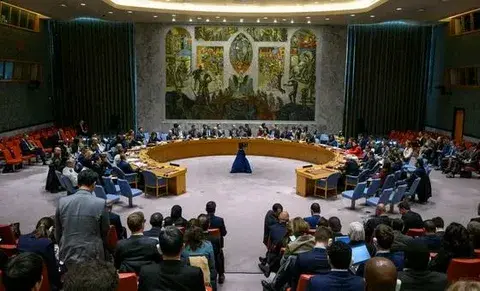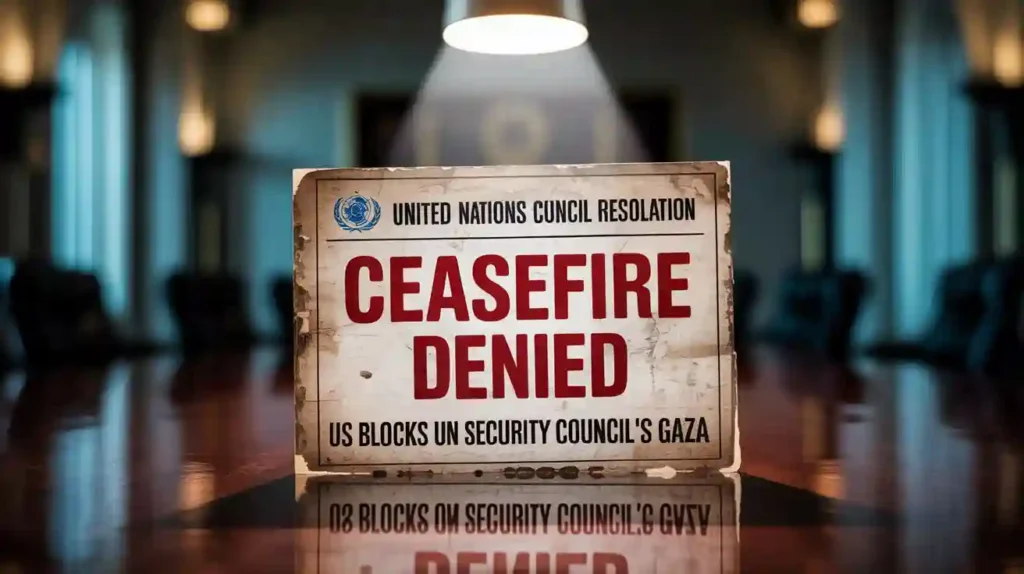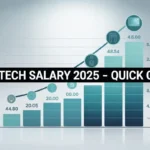On June 4, 2025, something important happened at the United Nations. Most countries supported a peace plan calling for a full and permanent ceasefire in Gaza. The goal was to stop the fighting completely and help people get the aid they need. But the United States blocked the plan. It used its veto power, which allows any one of the five permanent members UN Security Council to stop a resolution—even if every other country agrees. Because of this veto, the peace plan could not move forward. The fighting in Gaza continued, and the suffering grew worse. People around the world reacted with frustration and sadness. The phrase Ceasefire Denied appeared in news headlines and on social media. It became a powerful symbol—showing how the decision of one country can affect millions of lives and delay peace.
What Is a UN Veto?

The United Nations Security Council has 15 members. Five of them—the U.S. the U.K. France China and Russia—are permanent members. These five countries have a special power called a veto. If even one of them says “no” to a resolution it cannot pass no matter how many others agree. On June 4 the U.S. used this power to stop a plan that could have brought peace to Gaza. The U.S. said it blocked the plan because it did not name Hamas as the group that started the conflict. They also said the plan did not demand that Hamas release hostages or give up weapons. Because of this the U.S. felt the plan was unfair and could hurt future peace talks.
Why Is Gaza in Crisis?
Gaza has been suffering since October 2023. Thousands of people have died—more than 54000. Homes hospitals and schools have been destroyed. Many people don’t have enough food or clean water. Some are waiting in long lines just to get a small meal. Aid groups say the situation is very bad. They say children are hungry and families are scared. The UN made the ceasefire plan to help stop this pain. But when the U.S. said no the message Ceasefire Denied spread quickly. It meant that peace had to wait. Many people around the world were sad and angry.
Why Did the U.S. Say No?
The U.S. government said the plan was not complete. They believe that stopping the fighting right now would let Hamas become stronger. They want any peace plan to include steps like:
- Releasing the hostages
- Making sure Hamas does not keep weapons
- Helping both sides reach a fair deal.
Some leaders like those in France and China disagreed with the U.S. They said that people in Gaza need help now not later. Human rights groups said the U.S. veto was wrong and would make the crisis worse.
This is why Ceasefire Denied became more than just a news story. It became a symbol of how politics can stop peace even in a time of great need.
What Can We Do Now?
Even though the ceasefire resolution failed there are still ways to help.
Trusted aid groups like UNICEF Doctors Without Borders and the World Food Programme are still working in Gaza. They bring food clean water and medicine to people who need it most. Donating to these groups is one way anyone can make a difference. Governments can also take action through the UN General Assembly. This group does not have the power to make laws but it can speak for the world. A new plan called UNSC Resolution 2735 is now being discussed. It links a step-by-step peace process with the release of hostages. Many believe this is a fairer way to move forward. Also people can help by sharing the truth. Reading and spreading accurate news helps keep attention on Gaza. Legal experts and journalists are watching the crisis closely. Their work helps protect human rights. The more we talk about what’s happening the more pressure there is for leaders to act. The more people care the more hope there is for change.
What Is Ceasefire Denied Really About?
Ceasefire Denied is not just a phrase. It means that help was stopped. It means peace was delayed. And it shows how much power one country can have over a global decision. Some people say the veto system needs to change. They believe that when lives are at risk no one country should be able to say no to peace. Many are calling for reform so that the UN can act faster during crises. This moment is making people think about the kind of world they want to live in. A world where all voices matter—or just the voices of the powerful?
FAQs
What is a UN veto?
It’s a special power that lets five countries block any decision even if everyone else agrees.
Why did the U.S. block the ceasefire plan?
They said it did not ask Hamas to release hostages or give up weapons and did not blame them for starting the war.
How does the veto affect Gaza?
It stopped a plan to end fighting and bring in more aid. People are still suffering because peace was delayed.
What can we do now?
Support aid groups share real news and ask leaders to push for peace.
Why is “Ceasefire Denied” important?
It shows how political power can stop help in a crisis—and why global rules may need to change.
Conclusion
The U.S. decision to veto the UN’s Gaza ceasefire resolution has become a turning point in the global conversation on war, peace, and justice. In the face of a growing humanitarian crisis, the move showed how political power can sometimes block life-saving solutions. The words Ceasefire Denied now reflect not just a failed vote, but the pain of thousands and the frustration of the global community. Still, this moment can inspire change. People around the world can speak out, support aid efforts, and demand that leaders put humanity first. Even though the ceasefire was denied, the chance to act is not. The world must now choose compassion over conflict, unity over division, and peace over silence. In doing so, we can help turn this crisis into a call for lasting peace and justice.



